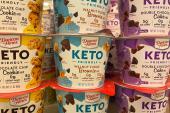Another Low-Cal Sugar Substitute Linked to Cardiovascular Risks
Following earlier work on erythritol, these latest findings boost concerns about not-so-sweet effects of sugar alcohols.

High blood levels of the sugar alcohol xylitol, used as a low-calorie sweetener in candies, chewing gum, and baked goods, enhance platelet reactivity and thrombosis formation and are associated with an increased risk of MACE, new data indicate.
“Collectively, all of the data point to xylitol [being] both clinically associated with and mechanistically linked to enhanced thrombosis potential,” Stanley Hazen, MD, PhD (Cleveland Clinic, OH), lead author of the study, told TCTMD. “This is the same signal that we had seen before with the other sugar alcohol erythritol.”
As with the current study, the erythritol research showed the sugar alcohol to be associated with increased MACE both when produced endogenously as part of cell metabolism and when ingested as a sugar substitute.
Sugar alcohols, or polyols, are increasingly used in “sugar-free” foods and drinks marketed to people trying to lose weight or avoid an insulin response to sugar, but according to Hazen’s research, they may be more trouble than they’re worth from a cardiovascular perspective.
“For anyone who is middle-aged or older—because we know most middle-aged individuals have two or more cardiovascular risk factors—I’m suggesting they avoid all sugar alcohols,” Hazen said.
For some, eating or drinking something sweetened with sugar might be the better option, he added, “because with sugar you don't end up suddenly increasing your platelet responsiveness—but we are seeing that with erythritol or xylitol.”
While it’s too early and there are simply too many other polyols that need to be similarly tested to know if the MACE and prothrombotic risk associations are a class effect, Hazen said for now, it is his working hypothesis.
A drug would never pass FDA clearance if it showed that it kills a dog in a safety study. Stanley Hazen
Problematically, manufacturers can list “sugar alcohols” on products without naming a specific one as the ingredient, making it difficult for consumers to avoid individual polyols even if they wanted to do so. “That's one of the things that we need to have an outcry about: there has to be more labeling . . . and until we have more information about these, they should not be generally recognized as safe,” Hazen said.
In an editorial accompanying the study in the European Heart Journal, Juerg H. Beer, MD, and Meret Allemann, MSc (both University of Zurich, Switzerland), note that sugar alcohols “are often termed ‘natural’ and implicitly harmless . . . because they can be extracted from berries, oats, birch, sugar cane bagasse and corn husk.”
As such, they say, the research by Hazen and colleagues is both timely and alarming, and raises myriad questions for consumers and researchers.
“No inflammatory responses or sex differences were observed by the authors,” they write. “However, what about other potential subgroups at risk, eg patients with low transaldolase activity who are then exposed to very high levels of sugar alcohols due to individually slower metabolism/clearance? Are they more prone to a particular cardiac risk as has been shown for patients with liver disease?”
Three-Year Endpoints Significant
For the study, Hazen and colleagues led by Marco Witkowski, MD (Cleveland Clinic), conducted untargeted metabolomics studies on overnight fasting plasma samples from 1,157 patients (mean age 65 years; 36% female) undergoing elective diagnostic cardiac evaluations.
Higher circulating levels of endogenous xylitol were associated with incident 3-year MACE risk, which was confirmed after multivariable adjustment compared with a validation cohort (HR 1.57; 95% CI 1.12-2.21).
Mechanistic studies further showed xylitol enhanced multiple indices of platelet reactivity and thrombosis formation. Additionally, increased calcium mobilization was seen, as were increased platelet-leukocyte aggregates and shortened occlusion times in a carotid thrombosis model.
Next, when 10 human volunteers were given a xylitol-sweetened soft drink, their plasma levels were markedly raised at the same time that multiple indices of platelet responsiveness were enhanced. The increased platelet activity occurred as early as 30 minutes after finishing the drink, and the findings were similar in all participants who consumed it.
“Collectively, the data send a warning sign that xylitol may have platelet-activation-mediated prothrombotic effects and may precipitate (preexisting?) clinical cardiovascular disease as shown by this 3-year observation time,” Beer and Alleman note.
While there is no solution for blocking endogenous or exogenous xylitol levels, ongoing research could expose ways to do so with specific receptor blockers or even aspirin.
According to Hazen, avoiding sugar alcohols and other artificial sweeteners can be a difficult task. Some studies have detected polyols in the plasma of presumed nonconsumers of artificial sweeteners who were told to avoid them prior to enrollment in clinical trials; other studies have found them to be readily detectable in ground water and waste effluent.
To TCTMD, Hazen reiterated that avoidance is best, but said that regulation and enhanced oversight by regulatory authorities tasked with keeping food safe for consumers is an ongoing need given the lack of transparency of specific sugar-alcohol ingredients, not to mention the fact that even minute amounts of polyols have been shown to be lethal to dogs.
“A drug would never pass FDA clearance if it showed that it kills a dog in a safety study, and yet we're [consuming] it at up to 10,000-fold higher amounts in a portion size such as one diabetic cookie,” he said.
L.A. McKeown is a Senior Medical Journalist for TCTMD, the Section Editor of CV Team Forum, and Senior Medical…
Read Full BioSources
Witkowski M, Nemet I, Li XS, et al. Xylitol is prothrombotic and associated with cardiovascular risk. Eur Heart J. 2024;Epub ahead of print.
Beer JH, Allemann M. Xylitol: bitter cardiovascular data for a successful sweetener. Eur Heart J. 2024;Epub ahead of print.
Disclosures
- Witkowski reports no relevant conflicts of interest.
- Hazen reports royalty payments for inventions or discoveries related to cardiovascular diagnostics or therapeutics from Cleveland Heart Lab and Procter & Gamble; consulting for Zehna Therapeutics; research funding from Zehna Therapeutics, Proctor & Gamble, Pfizer, and Roche Diagnostics; and is eligible to receive royalty payments for inventions or discoveries related to cardiovascular diagnostics and therapeutics from Zehna Therapeutics.




Comments